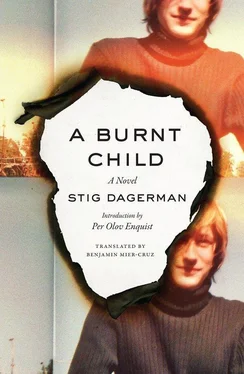A few minutes of silence pass before they sit down. The table is set for seventeen, and the widower stands between the sisters and starts to count. Counts the small plates and the chairs and only reaches sixteen. But after three tries, he hits seventeen. The light in the room is dim, and the seventeen faces are flushed after the storm and grief. The awkward, silent minutes that pass are saturated with sweet sorrow. At first it’s completely silent, then less so because someone is rubbing his hands, rubbing and rubbing as one does before some hard work. Then someone coughs so that the rubbing won’t be heard. Then someone whispers something, and someone coughs again so that the whispering won’t be heard. Then the widower turns around.
Let’s sit down then, he says, almost whispering.
Dresses rustle and shoes squeak. Chairs scrape and purse clasps snap. It is dark and solemn in the room, and all of them, feeling curiously pure where they are sitting, look down at their white plates. Pure, almost like children. And the plates are shiny enough for them to reflect their feelings in them, making a beautiful picture.
But something embarrassing happens to the widower. He is sitting next to the son, and the pretty sister is sitting on his other side. He is looking around for the food and drinks, already raising his hand to wave for them. Then the double doors open, and three white-clad waiters carrying trays enter in succession. They look so curiously at him as they pass by that he squirms and lowers his eyes. This is when he first notices the candle. One by one, they all notice the candle, the tall white candle in the black candlestick that is burning all alone on the table. One by one, they look at the candle and at the large white plate in front of the widower. Then they look at him.
You are sitting in Alma’s seat! someone says shrilly.
It is the ugly sister who says it. Her eyes are blinking behind her foggy glasses, and he could have hit her for having said it so loudly. He should be able to get up with dignity, but instead his demeanor is frightened, humiliated and frightened. A used match has been left on Alma’s white plate.
Now the son is the one sitting nearest the candle. It is his mother’s candle burning down. He looks at it but only feels emptiness. He stares into the flame until he can see nothing else, and, blinded, he tries to think: this is my mother’s life burning away. It is my mother who is slowly dying.
But he knows that she is dead and that the candle doesn’t change anything. It’s just an ordinary candle that is burning, and once it has burned out, nothing else will have happened but that an ordinary candle has burned down to its stick. Looking at the fiancée, he notices that she doesn’t dare look at the candle. She can only bear to look down at her lap, where a crumpled-up handkerchief is. Otherwise she would have to cry.
The son watches his father, watches him for a long time. So long that he forgets to eat. His sandwich sits uneaten on his plate and his beer remains untouched because he suddenly has the urge to look into the father’s eyes. He still doesn’t really know why; he just knows that he has to look into his eyes—if only for a second. But the father isn’t looking in the son’s direction. The candle is in the son’s direction, and he doesn’t want to see the candle. It’s a beautiful candle, and although he appreciates what is beautiful, he doesn’t want to see it. So he looks in the opposite direction, in all other possible directions. He becomes sweaty and red from twisting his neck so much. He nods to the guests across him and to each side of him, tosses a word here and another there, and drops a fork with a piece of herring into his lap. Suddenly, he forgets where he is and starts laughing, laughs as one does at something trivial. Then the ugly sister takes him by the arm, pinches him above the elbow, and says so that almost everyone can hear it:
You shouldn’t laugh, Knut!
No, he shouldn’t laugh. He realizes this, and icy shame shoots through his body, paralyzing him. He pulls out his handkerchief, which is dry now but will soon turn wet from sweat, the sweat of shame. He hides behind it for a while, composes his expression so that when everyone can see him again he is wearing a beautiful mask, a peaceful and beautiful mask of earnestness, and perhaps even grief. And when the hard liquor is being served, he is able to look at the candle on account of the mask. But the son is sitting in front of the candle, and the son’s eyes sink into his own, piercing them so that it nearly burns. This makes it easier for him to look at the candle because it’s a beautiful candle, one he can appreciate. But the son’s eyes are not beautiful, so he cannot love them. He cannot even bear to look at them.
They have a drink in silence in honor of the deceased. Then someone gives a sigh of satisfaction after finishing, but his wife coughs to cover it up. The widower coughs, too, and then starts tapping on his glass.
A moment of silence for Alma, he says and bows his head.
Then they all bow their heads. And nearly all of them think about the deceased. The candle burns with a tall, bright flame. Outside, the snow is whirling and dogs are barking. Inside, it is silent and warm, and from a distance they can hear sweet music coming from the restaurant. A minute is a long time. A lot can happen. One of them sees the coffin sinking and being swallowed up by a hole. One sees the ambulance with red lights skidding through the snow, and another sees Alma sitting in his yard with her swollen legs on a pillow. One of them sees her when she was young, standing on a flight of stairs with a towel on her head. One hears her voice saying something disturbing through a door. He shakes his head until a better memory comes to mind. One always comes when you shake your head.
But one of them thinks of something else and wishes that the minute would finally end and that the candle would burn out quickly. The silence and the candle frighten him that much. There is someone else who doesn’t see her either, because he knows that she is dead and that only a big empty hole is left when someone is dead. For the entire minute, he looks down at his plate, which has two frightened red eyes on it the whole time. For a whole silent minute he thinks, Why is Papa so afraid? And then he realizes that that was exactly what he wanted to know: whether these eyes were mourning or whether they were merely afraid.
After that, there isn’t a silent moment for the rest of the evening. They are given a lot of alcohol, suspiciously more than they have a right to, and it tastes good. First, it warms you and gives you beautiful eyes, and then it makes everyone else’s eyes beautiful, too. Everything hard becomes soft, and all that is yours becomes theirs. If you give someone your hand, there is someone to take it. And if you say something, there is someone who will listen as if it were worth listening to. You get closer to each other, and it feels good to get closer. Your lips become beautiful, and your mouth becomes gentle and friendly. Everything is warm and all shadows disappear. Sorrow itself takes on the form of happiness.
They look at the candle, which is burning lower and lower and which will have soon burnt out. But they are not afraid of it, or afraid that it’s burning so quickly, or that someone’s life is burning away with the bright, glaring flame. Bright and glaring? No, it is soft and warm, and the lower it sinks, the softer it becomes. The lower it sinks, the softer the memory of Alma becomes. Then everyone pulls out photographs and holds them up for their neighbors’ lovely eyes to see. All pictures become lovely when they are viewed by lovely eyes.
She was kind and patient, says the woman who had stood on the sidewalk and watched the ambulance skid by. She was beautiful in death and so gracious in the mortuary with her hands folded together. You could hardly tell that she fell on her forehead.
Читать дальше












